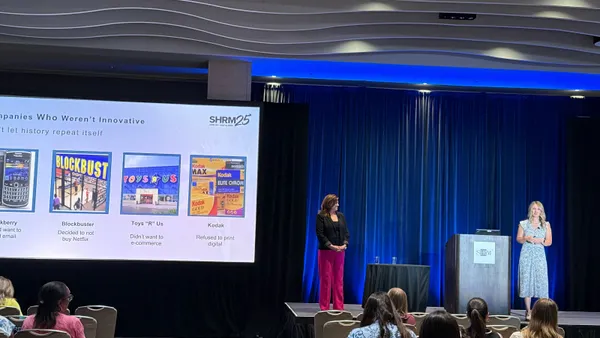Dive Brief:
- Nearly all Fortune 500 companies (97%) fail to "hyper-personalize" the candidate experience, according to the findings of Phenom People's fourth annual candidate experience report, The State of Candidate Experience: 2020 Benchmarks. Phenom People, a talent experience management firm, said that the report provides insights into where employers are meeting job seekers' expectations. It is based on the analysis and ranking of Fortune 500s on how they appeal to, engage and turn job seekers into new hires.
- The report also found that 94% of Fortune 500s don't include a chatbot in their candidate experience, 90% don't offer a social login that allows candidates to browse relevant jobs, and 86% don't provide candidates with semantic search capability.
- The report also notes that despite growing discussion around the use of artificial intelligence (AI) in recruiting, 97% of those surveyed scored poorly regarding AI's use on company career sites. "Employers must stop neglecting their candidate experiences. Talent acquisition teams are just as responsible as other departments for improving the bottom line," Mahe Bayireddi, CEO and co-founder at Phenom People, said in a media release.
Dive Insight:
Based on the responses of job seekers in a ManpowerGroup Solutions survey, the best candidate experience combines technology with personalization. Although job seekers use a range of tech tools during the hiring process, a quarter favor in-person interviews when interacting with employers, the survey found. Given this outcome, HR managers can't afford to rely solely on technology to attract and engage candidates; they'll want to make sure that the human touch is included in the process.
In fact, the human touch beats out technology for some job seekers; 69% of workers in a Yoh survey think AI doesn't belong in certain parts of the recruiting process. Around 40% of respondents think it shouldn't be used to select new hires and a third reject its use in virtual interviews. Where candidates object to AI's use in recruiting, employers may need to step in with the personal touch to keep job seekers engaged and inclined to accept a job offer, if extended. Yoh President Emmett McGrath said in a media statement that AI has a place in recruiting, but in a limited way. "AI technology should be used only to augment and enhance, not replace, the recruitment function," he said. "In order for it to be fully effective, this technology must be used in conjunction with the experience, skill and intuition of human recruiters and hiring managers."
While some job seekers may object to AI's use in recruiting, half of the employers in a Montage research report are using AI for upfront recruiting procedures like scheduling, screening and sourcing. Since these tasks are often the most tedious and time-consuming for HR and recruiters, it may be worth the investment to use tech tools that can complete the tasks faster, more efficiently and cost-effectively.











